Our recommendations include a mix of ecommerce website builders, online marketplaces, and crowdfunding platforms.
8 Best Etsy Alternatives for 2024
This article is part of a larger series on Retail Management.
Etsy’s 30% increase in seller fees has pushed many sellers to look for alternatives to Etsy. In this guide, we line up our top Etsy alternatives into three categories: ecommerce website builders, online marketplaces, and content creation/crowdfunding platforms.
The best online store alternatives to Etsy are:
- Shopify: Best overall online store builder
- Big Cartel: Best for artists and creatives selling a limited number of products
- Squarespace: Best for beautiful templates and blogging tools
- IndieMade: Best standalone online store that syncs with Etsy
The best Etsy alternative marketplaces are:
- Bonanza: Best for Etsy sellers wanting to reach a new audience
- Amazon Handmade: Best for sellers wanting an automated fulfillment service
The best crowdfunding platforms that can serve as alternatives to Etsy are:
- Patreon: Best for content creators with marketing know-how
- Ko-fi: Best for creators who offer products and subscriptions
There's Great Design In-Store: Try Squarespace's e-Commerce-Ready, Easy-to-Use Website Builder |

|
Receive 10% off your subscription with the exclusive code FITSMALLBUSINESS10 |
If you’re serious about growing your craft business online, use an ecommerce website builder because it gives you the most flexibility and complete control over your data.
If you are looking for similar buyer reach to what Etsy offers, another marketplace would drive the most traffic without requiring as much marketing effort. Finally, if you have social media following, such as on TikTok and Twitch, and need a content creation platform to sell products or merchandise, go with crowdfunding platforms.
Top Alternatives to Etsy Compared
Even with Etsy’s fee hikes, it is still one of the best platforms for independent sellers because of the sheer number of shoppers that use it and how easy it is to set up and maintain. If you still think Etsy might be your best choice, read our guide on how to sell on Etsy, follow our selling tips to leverage your Etsy store, and read our comprehensive guide on Etsy seller fees.
Shopify: Best for Makers Ready to Grow Their Online Business

Pros
- Unlimited products
- Extremely scalable
- Multichannel capabilities
Cons
- Limited exposure; need marketing
- No free plan but does offer free trial
- Add-ons (apps or integrations) can get expensive
Overview
If you want to take your handmade business a step further, Shopify is easy to set up and affordable for the creative maker who wants to jumpstart their business and provides powerful selling tools to help them scale their online store.
Where Shopify Beats Etsy:
- No listing fees and lower transaction fees
- Embeddable Buy Now buttons
- Built-in point-of-sale (POS) app
- Powerful marketing features, such as abandoned cart saver, email marketing, and SEO tools
- 24/7 live chat, email, and phone support
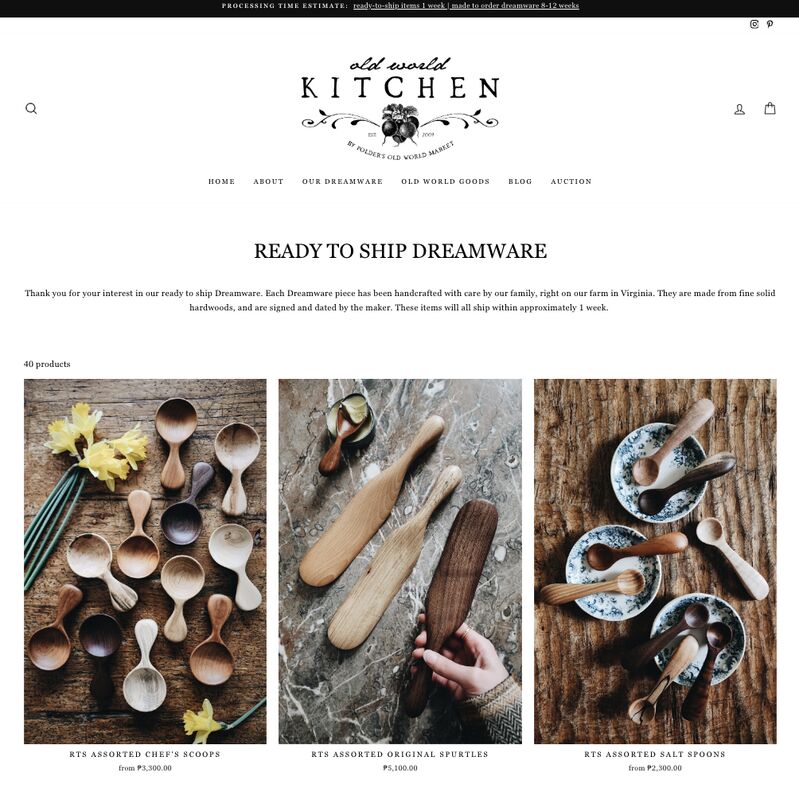
Old World Kitchen launched its first ecommerce presence on Etsy and outgrew the platform when it started getting more sales and established themselves better as a brand. It migrated to Shopify to have its own full online store.
Shopify has earned the top spot in our list of best ecommerce platforms for years. I regularly test and evaluate dozens of ecommerce platforms, and Shopify has consistently outranked and outperformed them all. This is why I consider Shopify as the best alternative to Etsy for serious shop owners.
With Shopify you get a full-blown standalone store so you can easily showcase your brand. Its backend system is user-friendly, with site building and store management operations easily doable even for the non-tech-savvy small business owner.
However, unlike Etsy, Shopify doesn’t have the advantage of tapping into a marketplace of customers ready to shop. Since Shopify doesn’t have the traffic and customer base Etsy provides, you would need to start from scratch and market an online store. Fortunately, Shopify has plenty of free built-in tools, such as SEO tools and an email marketing app, to help market your business.
Shopify doesn’t have a free plan but offers a three-day free trial with the option to extend it for $1 per month for three months. It also does not charge listing fees.
- Paid plans: Starts at $39 a month
- Transaction fees: None, if using Shopify Payments
- Payment processing fees: 2.9% plus 30 cents
You can read more about Shopify fees in our ultimate guide on Shopify pricing plans.
Big Cartel: Best for Creatives Selling Limited Products

Pros
- Low monthly fees
- Stylish website templates
- Straightforward platform
Cons
- Lacks marketing tools
- Limited integrations and payment providers
- Not scalable
Overview
Big Cartel especially designed its platform with artists in mind, knowing it would compete with Etsy as the platform of choice for creative makers. I recommend Big Cartel for artists selling a limited number of products at a time or running a seasonal business. You can use its free plan easily with zero to little overhead costs.
Where Big Cartel Beats Etsy
- No transaction or listing fees (although payment processing fees will still apply)
- Standalone online store, even on a free plan
- Connect a custom domain on a free plan
- Stylish website themes suited for creatives wanting to highlight their products
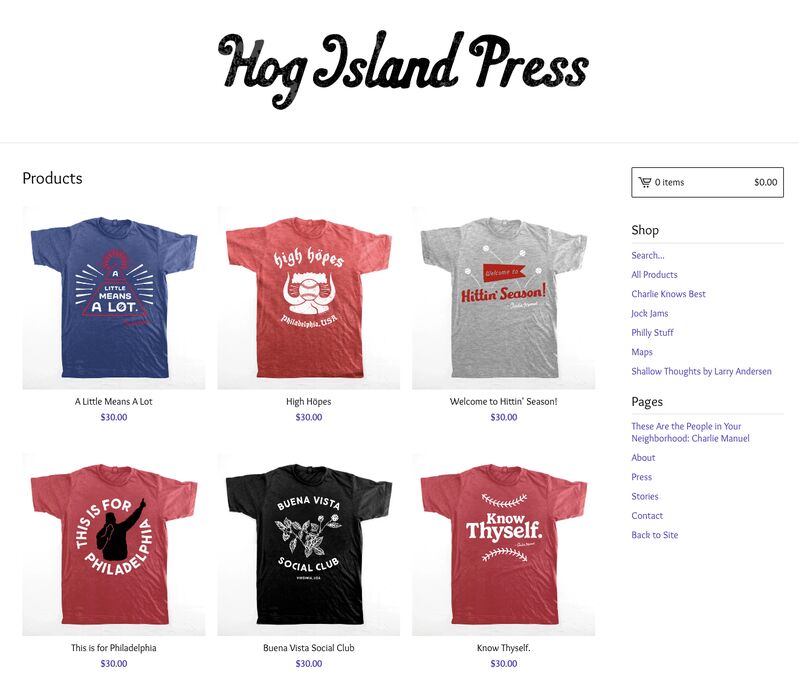
Hog Island Press is a Big Cartel store that sells T-shirts with its own designs.
Big Cartel offers stylish website templates and the ability to connect a custom domain on a free plan—all of which earned the platform a spot in our top picks for free ecommerce website builder.
Big Cartel has the edge over Etsy with zero listing and transaction fees and a fully customizable website, complete with multiple pages and a contact form—all on a free plan. While its free plan has a five-product limit and lacks marketing features, you can upgrade easily to unlock more products at a low monthly fee ($9.99) and refer to a strong artist community to help you figure out how to market your business.
Big Cartel offers a free plan to sell up to five products, create a standalone website (with multiple pages, a contact form, and a store), and use a custom domain. Paid plans start at $9.99 a month:
- Software fees:
- Gold ($0): Sell up to five products
- Platinum ($9.99): Sell up to 50 products
- Diamond ($19.99): Sell up to 500 products
- Transaction fees: None
- Payment processing fees: Stripe: 2.9% plus 30 cents; PayPal: 3.49% plus 49 cents
Squarespace: Best for Templates & Blogging

Pros
- Sell on Instagram and Facebook
- Product and inventory management tools
- Stellar blogging tools
Cons
- Transaction fees without an upgrade
- Limited payment options
- Ecommerce features are only available on higher plans
Overview
Squarespace is another excellent ecommerce platform alternative for artisans. It provides a modern website builder with various templates and a drag-and-drop editor, making it ideal for beginners and those without technical knowledge in building a website.
Where Squarespace Beats Etsy
- Standalone website with drag-and-drop site builder
- Multichannel selling
- Sell services along with physical and digital goods
- Several blogging features similar to WordPress
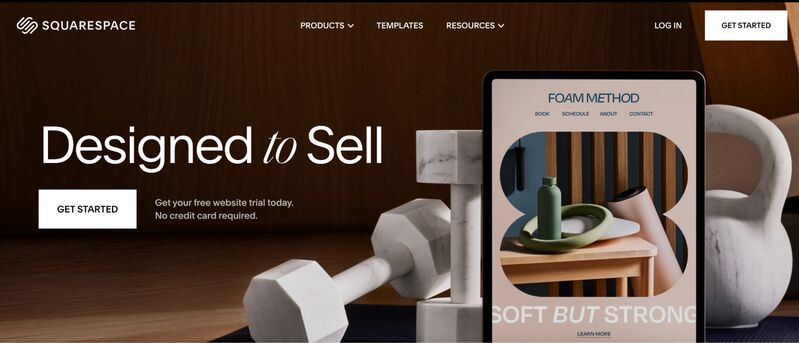
Squarespace’s templates are well-known to be sleek and stylish.
What’s great about Squarespace is that it makes migrating from Etsy quick and easy, allowing you to keep your products and product URLs—making it one of the more accessible alternatives to Etsy if you’re looking to transfer platforms.
Additionally, if you are a seller that relies on creating content to promote your products, you can take advantage of Squarespace’s powerful blogging tools and market your products with its built-in social media tools.
Squarespace doesn’t offer a free plan, but its entry-level ecommerce plan generally is less expensive than most ecommerce platforms. Its monthly plans with ecommerce capabilities have the following fees:
- Business ($33): Entry-level plan for ecommerce, unlimited products (physical and digital), 3% fee on transactions on top of payment processing fees
- Basic Commerce ($36): Same features as Business but without the extra 3% transaction fee, more advanced analytics
- Advanced Commerce ($65): Same features as Basic Commerce plus a United States Postal Service (USPS) shipping calculator, abandoned cart recovery, and the ability to sell subscriptions
IndieMade: Best Standalone Store for Syncing With Etsy

Pros
- Low monthly fees
- Additional pages for standalone website
- 30-day free trial
Cons
- No built-in audience
- No product listing customization on lower-level plans
- Limited products unless on the highest-paid plan
Overview
IndieMade is a great Etsy alternative if you prefer a standalone website but have budget restraints and limited technical know-how on setting up a fully functional online store. It also provides an Etsy integration, so its 30-day free trial lets you test things out first without exerting too much effort by migrating product listings.
Alternatively, its two-way Etsy integration is a great option if you want to explore alternatives without closing your Etsy shop.
Where IndieMade Beats Etsy:
- No transaction or listing fees
- Provides a standalone website
- Additional features for adding a blog, calendar of events, and image galleries, and pages such as announcements
- Built-in inventory management and marketing features
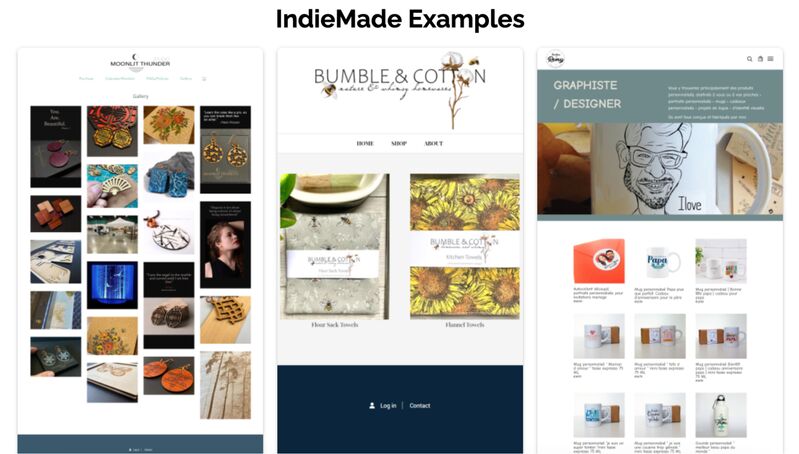
Examples of IndieMade shops
IndieMade’s platform is straightforward, making updating your product listings with video and image galleries easy. In addition to building an ecommerce store, you can add a blog, calendar of events, image galleries, and other pages.
Like many Etsy alternatives for sellers, IndieMade does not have a built-in marketplace, so you can’t get the traffic that Etsy offers. However, its monthly fees are the lowest among Etsy’s standalone store alternatives, making it an excellent option for creative artists on a limited budget who want their own store without Etsy’s branding.
IndieMade provides a free 30-day trial, with no credit card required. Paid monthly plans come in four tiers and include the ability to use a custom domain and build a standalone online store:
- Basic ($4.95): Sell up to 10 products with up to five images per product, 10 pages, and 10 galleries
- Standard ($12.95): Sell up to 250 products with up to 10 images per product, and unlimited pages and galleries
- Pro ($14.95): Sell up to 500 products with up to 20 images per product, and unlimited pages and galleries
- Plus ($19.95): Sell unlimited products with unlimited images, and unlimited pages and galleries
Did you know?
Victorian Style Treasures maximizes IndieMade’s provision for additional pages, setting up pages for its store policies, contact form, and product categories. If you click on any of its product pages, you can see how it integrates multiple pages in a related products section at the bottom.
Bonanza: Best for Etsy Sellers Who Want to Reach a New Audience

Pros
- No listing fees
- Lower transaction fees than Etsy
- Automated product listings on Google Shopping and eBay
Cons
- Not limited to handmade items
- Complicated fees
- Smaller audience than Etsy
Overview
If you seek companies like Etsy that work similarly, Bonanza is for you. It is an online marketplace with the same demographic as Etsy, albeit a smaller audience. However, Bonanza gives you the best of both worlds: You can sell on Bonanza for marketplace exposure and build your online store.
Where Bonanza Beats Etsy
- No listing fees
- Transaction fees based on item price alone and not item price plus shipping
- Multiple sales channels
- Automated product listings on other sales channels
- Focused advertising
- Create freebies to offer customers
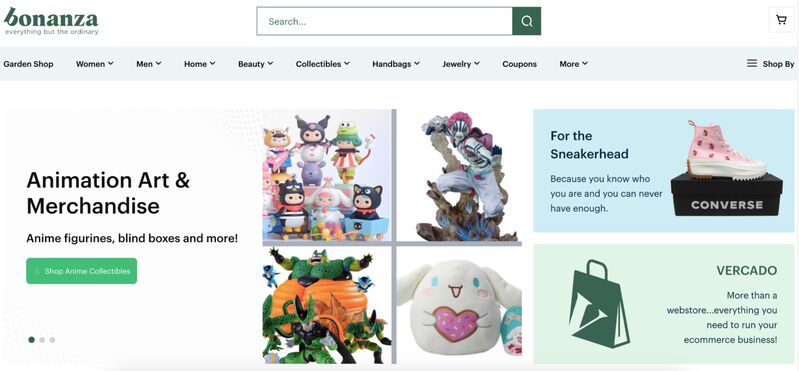
Bonanza has the same audience as Etsy—hobbyists, collectors, and crafters.
Like Etsy, there is no monthly fee to sell on Bonanza, but transaction fees are involved. However, Bonanza has lower transaction fees than Etsy and better marketing tools like cart abandonment savers, seller-first customer service, and buyer-to-seller communication.
Note, however, that on Etsy, shoppers can message sellers to negotiate prices but it’s not the norm on that platform. On Bonanza, price negotiations are typical and even expected. It is a good idea to keep this in mind when pricing products so you can have room to accept shoppers’ offers and let them feel like they’re getting a deal.
Bonanza is transparent about its fees and doesn’t charge anything until you make a sale. You only get charged against the Final Offer Value (FOV): “The amount that the buyer paid to you for the item sold, plus any portion of the shipping fee that exceeds $10.”
- Product listing fees: $0
- Transaction fees: 50 cents, plus 3.5% of the purchase price
- Advertising fees: Paid from your commission on top of transaction fees and can range between 9% and 30% of product sales
- Webstore builder (optional): $25 per month to create a fully functional online store
Amazon Handmade: Best for Sellers Who Want to Use an Automated Fulfillment Service

Pros
- Amazon-fulfilled shipping (Fulfillment by Amazon or FBA)
- Amazon analytics
- No monthly fees
Cons
- Strict customer data policies
- Expensive fees
- Lengthy application process for sellers
Overview
Amazon Handmade is the part of retail giant Amazon dedicated to crafts and handmade products. Amazon is the most visited online marketplace—averaging 2 billion monthly visits—in the US. If you are looking to tap into Amazon’s buyer reach, apply as a seller for Amazon Handmade.
Where Amazon Handmade Beats Etsy
- No product listing expiration dates
- Automated fulfillment service through Amazon FBA
- More in-depth analytics
- Amazon-sponsored ads

Amazon Handmade looks exactly like the Amazon store, except only handmade items are being sold.
Getting approved as a seller allows you to list your products, manage orders, and automate fulfillment through FBA within a central dashboard. Fees are waived for Amazon Handmade sellers, so you only pay for referral fees. However, Amazon Handmade charges more than Etsy on this—15% compared to 6.5%.
You must have a Professional selling account to sell on Amazon Handmade, which has a monthly fee of $39.99. However, once your application is approved, your selling fee is waived after your first month, saving $480 a year in fees. This discount is exclusive to sellers approved for Handmade.
There are no product listing fees, aside from a 15% referral fee on sales. Amazon Handmade fees are more expensive than Etsy’s, unless products are priced around $5 or less. Learn more about Amazon seller fees.
Patreon: Best for Content Creators With Marketing Know-how

Pros
- Competitive fees
- Paid per content produced/created
- Highly customizable campaigns
Cons
- Lacks built-in promotional tools
- Low discoverability, even with hashtags and keywords inside the platform
- Unpleasant user reviews
Overview
Although not considered an online marketplace or an ecommerce platform, Patreon has become increasingly popular as an Etsy alternative, especially for content creators. Etsy sellers maintain Patreon pages for their exclusive membership sites. If you are an Etsy seller with an established audience, Patreon will work for you.
Where Patreon Beats Etsy
- No listing fees
- Creator pages for workshops
- Membership subscriptions available
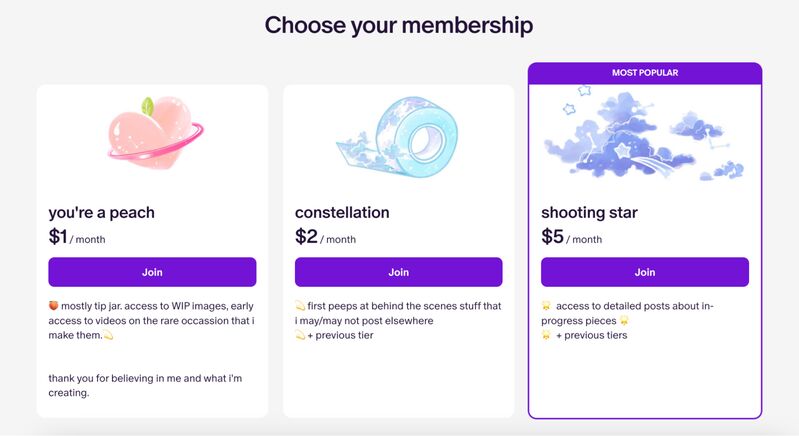
Moonchu is an Etsy seller who migrated her store to Shopify and maintains a Patreon account for her subscribers.
Primarily a crowdfunding platform, Patreon operates on a rewards-based technique, with subscribers (called patrons) making recurring payments on an ongoing basis to access a creator’s content.
Patreon became popular with Etsy sellers because of its membership tiers. Etsy sellers usually have a Patreon page as an exclusive membership site, with monthly content in how-to videos, project inspiration examples, and bonus products.
What Patreon lacks are promotional tools and a built-in audience. You cannot sell one-time products since you technically do not have a store. However, if you have an established buyer following, know how to market your products, and can produce a steady stream of content—digital, educational, and physical products—Patreon can be a beneficial platform.
Patreon is entirely free. It only deducts platform fees depending on your subscribed plan. Features are also available depending on your tier, with more functionalities unlocked in higher plans:
- Lite: 5% of the monthly income you earn on Patreon
- Pro: 8% of the monthly income you earn on Patreon
- Premium: 12% of the monthly income you earn on Patreon
Payment processing fees also apply:
- Standard rate: 2.9% plus 30 cents for donations over $3
- Micropayment rate: 5% plus 10 cents for donations of $3 or less
Do you have a large following on your social media accounts?
You can sell directly on your social channels by following our guides below.
- How to sell on Facebook and Facebook Marketplace
- How to sell on Instagram
- How to sell on Pinterest
- How to sell on TikTok
Ko-fi: Best for Artists & Creators Offering Subscriptions & Product Sales

Pros
- Can provide a paywall for exclusive content
- Low platform fees
- Unlimited products
Cons
- No standalone store
- Lacks multichannel selling features
- No built-in marketing tools
Overview
Ko-fi is a popular Etsy alternative because it combines the benefits of selling on Etsy and keeping a Patreon exclusive membership with lower fees.
Where Ko-fi Beats Etsy
- No listing fees
- Accepts donations or tips with zero platform fees
- Sell membership subscriptions and products
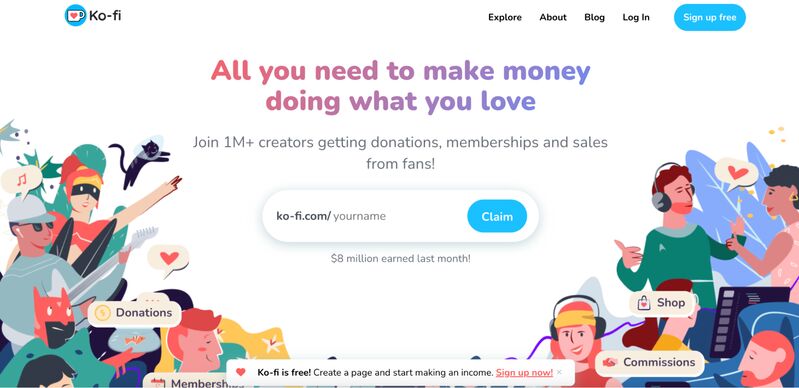
Ko-fi boasts more than a million creators on its platform.
Ko‑fi lets you accept donations, set up memberships, sell products, and accept commissions—all in one place. One unique feature of Ko-fi is helping you let buyers pay what they want. You can set a minimum price or leave it entirely open for buyers to set the amount they want to pay.
With Ko-fi, you are saved from the hassle of maintaining different platforms for your buyers.
Ko-fi doesn’t have platform fees for any donations you receive. A 5% transaction fee applies to any commission, membership, or shop sale. You also can subscribe to Ko-fi Gold for $6 a month (paid annually).
Methodology: How We Evaluated Alternatives to Etsy
We considered close to 40 platforms similar to Etsy—online stores like Etsy that operate the same way—narrowing them down based on pricing, ease of use, features (either better than or similar to Etsy), and customer support. We then tested the top options by signing up on their platforms and looking into their market reach and backend tools.
We also considered feedback from real-world users, especially Etsy sellers who have migrated to stores like Etsy.
Based on these factors, we classified our recommendations into three groups: ecommerce website builders, Etsy-like sites (such as online marketplaces), and crowdfunding platforms.
Meet the Experts
The following retail and ecommerce experts contributed to this article:
 | Meaghan Brophy is a resident retail and ecommerce expert at Fit Small Business with more than 10 years of retail experience and seven years of experience delivering actionable content to independent retailers. She has spent the last four-plus years at Fit Small Business testing retail and ecommerce software. |
|---|---|
 | Agatha Aviso is Fit Small Business’ resident ecommerce software expert. She has spent years testing and evaluating different platforms and building online stores. |
Frequently Asked Questions (FAQs)
Click through the tabs below to get answers to get answers from the most frequently asked questions about Etsy alternatives.
Etsy’s biggest competitors are marketplaces similar to Etsy, such as Bonanza and Amazon Handmade. Crowdfunding platforms like Ko-fi and Patreon are gaining traction and are increasingly popular with the younger generation.
Yes, it is. Etsy is the fourth-largest US ecommerce site by monthly visits, so it is an excellent way for creative artists and entrepreneurs to find a sizable market without spending a lot of upfront capital.
Choosing an alternative to Etsy should depend on your business needs and priorities—cost, market reach, or growth tools. If you are looking for free alternatives to Etsy, there are ecommerce platforms and online marketplaces that do not require monthly fees and offer zero transaction and listing fees.
If Etsy’s market reach is a priority, choose a marketplace with great buyer reach. Finally, if you want to grow your creative business and have your own website, use a robust yet easy-to-use ecommerce platform like Shopify.
Consider looking for an Etsy alternative if you want to save on transaction and listing fees, you are scaling your business and need more marketing tools or prefer to be more in control of your online store.
Bottom Line
When considering alternatives to selling on Etsy, decide which features you prioritize and go with a platform that gives you just that. If Etsy’s marketplace and built-in customer base are crucial to your business, go with a marketplace alternative or websites like Etsy, such as Bonanza, Ko-fi, Patreon, and Amazon Handmade.
However, setting up an online store is the way to go if you have serious plans to grow your online business. We recommend Shopify because of its affordability and scalability. You can sign up for a three-day free trial and extend it for three months for just $1 per month to see how it works and decide if it’s a good fit for your business.


